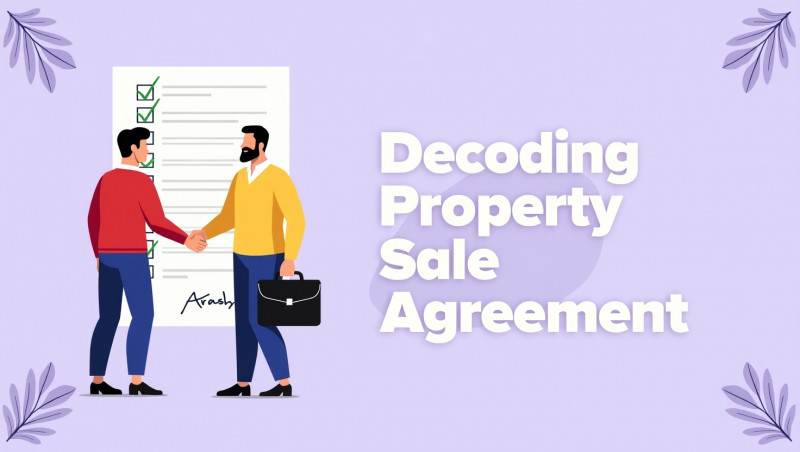- May 15, 2025
-
The Essential Guide to Sale Agreements: Protecting Your Property Transactions
In the world of real estate, the sale agreement is where the deal begins—and where your protection lies. It’s the document that clearly outlines the terms of the property transaction, making sure both buyer and seller are on the same page legally and financially.
Let’s walk through everything you need to know—from what a sale agreement should include, to how you can register it, and what happens if one party doesn’t follow through.
Why a Sale Agreement Is a Must-Have?
A sale agreement is a legally binding contract that defines:
- The property details
- The price and payment terms
- The time frame for completion
- The rights and responsibilities of both buyer and seller
Without it, misunderstandings and legal conflicts are just waiting to happen.
📌 Important: A registered sale agreement holds up in court and is enforceable by law. An unregistered document? Not so much.
What Should Be Included in a Sale Agreement?
Here’s a breakdown of what every solid sale agreement should have:
✔️ Complete Property Details
- Location: Full address of the land or property
- Boundaries: Clearly marked measurements and FMB references
- Survey number and classification (residential, agricultural, etc.)
- Ownership history and any past transactions
✔️ Encumbrance & Legal Clearances
- Property must be free of loans, mortgages, or disputes
- Include EC (Encumbrance Certificate) and Patta details
- Confirm zoning and government approvals (DTCP, CMDA, etc.)
✔️ Parties Involved
- Full names, addresses, and ID proof details of buyer and seller
- Signature and ID proof of two witnesses
✔️ Payment Terms
- Total Sale Price (e.g., ₹10,00,000)
- Advance Paid (e.g., ₹1,00,000)
- Remaining Balance
- Mode of payment: Bank transfer, demand draft, cheque
✔️ Time Frame
- Agreement date
- Payment completion period (e.g., 30–90 days)
- Possession date for property handover
✔️ Legal Clauses
- Penalty clause for delayed payments
- Cancellation clause in case of default
- Dispute resolution method (e.g., through arbitration or litigation)
How to Register a Sale Agreement in India
Once you’ve finalized the sale agreement, don’t stop there—get it registered for full legal protection.
Step-by-Step Process:
Step 1: Calculate & Pay Stamp Duty
- Stamp duty is based on your state’s regulations and the property's value.
- Use government-approved portals or visit the treasury for payment.
Step 2: Draft on Stamp Paper
- Print the agreement on appropriate non-judicial stamp paper.
Step 3: Signatures of Buyer, Seller & Witnesses
- Both parties sign in the presence of two witnesses.
- Witnesses should also sign with their ID details.
Step 4: Visit the Sub-Registrar’s Office
- Submit the signed document to the sub-registrar office where the property is located.
- Carry original ID proofs and address proofs of both parties.
Step 5: Verification & Registration
- Registrar will verify details and approve registration.
- Pay the registration fee, usually around 1% of the sale value (varies by state).
Step 6: Collect Registered Copy
- After approval, collect your certified copy of the agreement for your records.
🔐 A registered sale agreement is your strongest legal defense if disputes arise.
3. Payment is Delayed? Legal Notice Process
If the buyer doesn’t complete the payment by the agreed date, the seller can take legal steps.
Here’s how it works:
⚠️ Legal Notice
- Issue a formal legal notice via a lawyer
- Give the buyer a fixed grace period (usually 15 to 30 days) to make payment
💰 Impose Penalties
- If your agreement includes it, you can charge interest on overdue amounts
❌ Cancel the Agreement
- After the grace period, if payment is still not made, you can invoke the cancellation clause
- Notify the sub-registrar and file to invalidate the agreement
⚖️ Take Legal Action
- You can initiate litigation to either enforce the sale or seek compensation
- If you’re the buyer and the seller backs out, you can also sue for specific performance
📋 Quick Checklist for a Strong Sale Agreement
Final Thoughts
A Sale Agreement Is Your Legal Lifeline!
Whether you’re buying or selling, don’t rely on verbal promises or WhatsApp chats. A legally registered sale agreement is what gives your transaction structure, security, and enforceability.
Remember:
- Always verify property details and ownership history
- Include clear terms for payment, possession, and penalties
- Register the agreement—an unregistered one is a legal risk
- Involve a lawyer for drafting and vetting complex deals
The more watertight your agreement is, the safer your investment will be.


Comments :
Currently, there are no comments in this post. Be the first person to comment on this post.